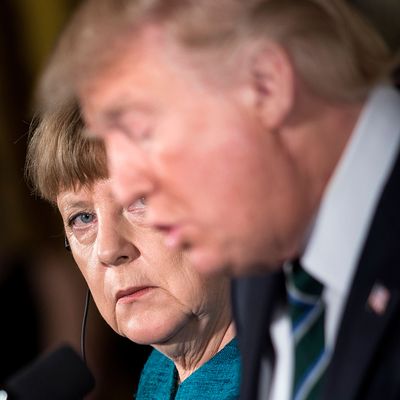
“Don’t watch what he says, watch what we do.” That’s from the good old days, just 12 months ago, when Trump Cabinet officials and his Senate enablers scurried around the world explaining away the president’s tweets.
Now, as we brace for a NATO summit, some of those same enablers — as well as Europeans desperately trying to avoid a public collapse — are arguing that Trump can take a victory lap on increased European defense spending, or offer some other words in Brussels that would make the gathering ordinary.
But nothing is ordinary about this moment. And it turns out “watch what we do” is very good advice. In the last few months, the Trump administration has taken repeated concrete steps to damage European and international institutions and specific European governments. A quick recap of some you may have missed:
- The administration imposed 25 percent steel tariffs and 10 percent aluminum tariffs on Europe, Canada, and Japan, our closest political and economic partners for decades; for good measure he threatened to leave the World Trade Organization, on which all those economies, smaller than ours, depend for reliable trade rules.
- Trump suggested to French president Emmanuel Macron that he should break up the European Union and get a bilateral trade deal from Washington instead.
- Trump told leaders at last month’s G7 Summit that the NATO alliance was “too costly” and “as bad as NAFTA”; in recent weeks his public statements have undercut shared NATO positions on Ukraine’s sovereignty and territorial integrity; and in the run-up to this week’s summit, he sent threatening letters to our allies demanding that they spend more money on defense.
- As the German government of Chancellor Angela Merkel faced a crisis with partners in her domestic political coalition (themselves under threat from farther-right parties) trying to force harsher treatment of refugees, the administration weighed in repeatedly against Merkel; and on the Fourth of July, the U.S. ambassador to Germany appeared to endorse far-right party members.
The idea that there can be a positive or neutral summit that strengthens the alliance, or somehow signals to Moscow that NATO is united, is ridiculous. It marks the kind of diplomatic thinking that Trump satirizes. What will be clear after the summit was already clear, if one wanted to see it, before: There is not a unified group of powerful countries ready to counter Russian geopolitical pressures on Europe and the Middle East. Countries on the Russian periphery cannot count on NATO support to chart future directions away from Moscow. North Africa and the Eastern Mediterranean won’t be getting infusions of stability from NATO, which also cannot offer a counterweight to Turkish president Recep Erdogan’s nationalist rhetoric.
Donald Trump didn’t do all of this alone — the rise of Moscow-sympathizing nationalist governments in Central Europe, and the U.K.’s self-inflicted Brexit wound also sapped NATO’s ability to offer what it claims to stand for. (The United Kingdom lost its foreign minister two days before Trump’s arrival, and its prime minister may face a vote of no confidence as he departs.) So did decades of European governments agreeing in word, but not in deed, with Washington’s calls for stronger shared defenses. And so, too, did the defenders of NATO who are still, with good intentions, repeating its Cold War–era purposes without explaining to Americans what the alliance’s informal founding creed of keeping “Russia out, America in, and Germany down” even means anymore, with Russia in our Facebook feeds and Angela Merkel the leader of the free world.
But the question to ask today is if there is anything that Trump can be induced to negotiate for. Merkel is clearly reaching for this by offering to renegotiate auto tariffs. Although Trump is personally obsessed with them, the sad fact is that the U.S. auto industry now manufactures relatively little that is of interest to the European market, where gas is expensive, cars are small, and targets for moving off gasoline power entirely are coming up fast. So Europeans and others need to think bigger. Is there an outcome — in the vein of the superficial successes of the Singapore Summit — that can get the boiling crisis in transatlantic relations back to a simmer? Or is Trump’s lifelong resentment of our allies so great that he can only destroy?
Even that best-case scenario just produces a situation, as we now have on the Korean peninsula, where nothing positive or productive happens, but Trump no longer has an incentive to batter the international system further to score points with his base. That’s not a sustainable long-term foundation for any foreign policy. But it’s where we are — not because of things the president has said, but things his administration has done.





























